Sustainable Farming magazine Fall 2019 (Volume 4, Issue 4)
News: Pig Out – Feeding For Health and Welfare Opinion: Farmers United Cover feature: Feeding Pigs Technical: Housing Benefits Technical: Working With Your Vet Technical: Kid You Not Technical: Grassfed Challenges Meet the Farmer: TLC Grassfed Beef in Enid, OK
News: Pig Out – Feeding For Health and Welfare
Opinion: Farmers United
Cover feature: Feeding Pigs
Technical: Housing Benefits
Technical: Working With Your Vet
Technical: Kid You Not
Technical: Grassfed Challenges
Meet the Farmer: TLC Grassfed Beef in Enid, OK
- No tags were found...
Create successful ePaper yourself
Turn your PDF publications into a flip-book with our unique Google optimized e-Paper software.
WORKING<br />
WITH YOUR<br />
VET<br />
VM/ISTOCK<br />
Most veterinarians have a lot to offer—but you must help<br />
them understand what you need, says Jennifer L. Burton<br />
“If someone brings you a dragon, a Martian<br />
or Bigfoot, you will be expected to provide care,<br />
protect public health and guard against any threat<br />
they may present to our food supply. My job is<br />
to give you the tools you need to figure it out.”<br />
So began my veterinary education …<br />
Veterinarians come with a variety of backgrounds<br />
and experiences, but we all share a<br />
similar core education. The concept of 'One<br />
Health' (see box) reminds veterinary students<br />
that human, animal and environmental health<br />
are intertwined, though medical science and<br />
clinical skills are taught using just a few standard<br />
species and systems.<br />
A working relationship<br />
Students are introduced to livestock production,<br />
nutrition and farm economics. Many programs<br />
incorporate courses on animal behavior and<br />
a few now offer elective classes addressing<br />
ecosystem health or sustainability. Aspiring<br />
Doctors of Veterinary Medicine—or DVMs—are<br />
asked to consider their role in animal welfare,<br />
though they may or may not have much exposure<br />
to animal welfare science. And while some groups<br />
are working to improve veterinary training in<br />
alternative medicine and sustainable agriculture,<br />
few programs currently offer continuing education<br />
credits for these topics.<br />
So if your vet sometimes looks at you as<br />
though you’re a Martian, it may be because your<br />
farm doesn’t match that ‘core model’ taught in<br />
school. But that need not hinder a great working<br />
relationship. Though practices may differ, most<br />
A LITTLE<br />
KNOW-HOW<br />
As alternative<br />
medicine gains<br />
popularity, many<br />
companion animal<br />
veterinarians are<br />
increasingly well<br />
versed in these<br />
treatments. Some<br />
have experience<br />
with livestock<br />
species—especially<br />
poultry, goats or<br />
pot-bellied pigs,<br />
which are often<br />
kept as pets.<br />
Remember: When<br />
seeking treatment<br />
advice for food<br />
animals, be sure<br />
to discuss residue<br />
risks.<br />
vets have a great deal to offer if you’re willing to<br />
help your vet understand what you do—and what<br />
you need.<br />
How can your vet help?<br />
Regardless of specific experience or practice style,<br />
your local vet is well equipped to help with these<br />
vital aids to your livestock operation:<br />
Early detection: Early treatment is the most<br />
effective treatment, especially when using<br />
alternative/non-pharmaceutical product.<br />
Your vet can help detect early signs of disease.<br />
Diagnostics: From vitals to blood tests, fecal<br />
exams to environmental swabs, your vet is<br />
armed with a suite of tools to gather information<br />
that can help you focus your approach.<br />
He or she can also help prevent disease from<br />
spreading within your herd, and determine if an<br />
infection is zoonotic (transmissible to humans).<br />
Procedures: Many vets are happy to teach<br />
procedures such as castration, disbudding, or<br />
local anesthesia such as a nerve block. Small<br />
improvements in your technique could lead to<br />
big improvements in welfare and production.<br />
Treatment plan: Is this alternative treatment<br />
safe to try? How will you decide if it’s effective<br />
enough? When should you switch to plan<br />
B? Even if unfamiliar with some alternative<br />
treatments, many vets are willing to help screen<br />
for toxicity and residue risks, help determine<br />
appropriate dosing, and suggest triggers for<br />
switching to a different treatment.<br />
Prevention: Parasite life cycles haven’t changed<br />
since your vet memorized them years ago,<br />
but recommendations on deworming and<br />
vaccination are regularly updated, and can be<br />
tailored to local ecology and farm practices.<br />
Local knowledge: Does this year’s weather<br />
favor certain parasites? Is there a new virus<br />
in the neighborhood? Your vet may be the<br />
first to know.<br />
Trade-offs: Even if they don’t have all the<br />
answers, farm vets are equipped to help<br />
optimize animal health in the context<br />
of production needs, market demands,<br />
economics, labor, and safety concerns.<br />
A two-way street<br />
Depending on specific interests and experience,<br />
your vet may be able to provide useful input<br />
for any number of situations. For example, they<br />
might offer nutrition advice to meet demand for<br />
‘soy-free’ eggs or assist in planning an on-farm<br />
trial to see if a homeopathic or herbal remedy<br />
helps resolve a persistent health issue on your<br />
farm. Fruitful collaboration is most likely<br />
to emerge if you follow these guidelines:<br />
Help your veterinarian understand what you<br />
do and what you want. Use the list above ('How<br />
can we help?') as a starting point and ask where<br />
they think they can contribute significantly to<br />
animal health on your farm or ranch.<br />
Your veterinarian’s most valuable asset is their<br />
expertise. AGW recommends you have regular<br />
preventative care visits from your vet (i.e. do not<br />
just call when an animal falls sick). Some vets<br />
'ONE HEALTH'?<br />
The ‘One Health’<br />
concept recognizes<br />
that the health<br />
of people is<br />
connected to the<br />
health of animals<br />
and the shared<br />
environment.<br />
A 'One Health'<br />
approach<br />
encourages<br />
collaborative<br />
efforts of many<br />
experts (like<br />
disease detectives,<br />
laboratorians,<br />
physicians and<br />
veterinarians)<br />
working across<br />
human, animal,<br />
and environmental<br />
health to improve<br />
the health of<br />
people and<br />
animals, including<br />
livestock.<br />
Find out more at<br />
cdc.gov/onehealth<br />
will offer preferential fees if you arrange routine<br />
consultations and services. If you do not utilize<br />
standard services, such as herd health checks,<br />
you may need to negotiate consultation fees.<br />
Appropriate handling facilities will allow your<br />
vet to safely examine or treat your animals.<br />
Practicing good handling with your livestock<br />
will minimize the 'fight or flight' stress response<br />
and protects care givers from possible injury.<br />
Your vet may wish to use a 'One Health'<br />
approach, collaborating with other providers to<br />
meet your needs. Work with them to facilitate<br />
teamwork and ensure comprehensive care for<br />
your herd or flock.<br />
When determining a course of action, make<br />
sure your goals, your values and sound science<br />
are all thoroughly considered.<br />
Collaboration<br />
Whole-farm health is a community endeavor. Your<br />
veterinarian can provide invaluable assistance to<br />
protect animal health and product safety, and may<br />
be able to help address other complex problems<br />
such as environmental or human health impacts.<br />
For specialized treatments, a collaborative<br />
approach may be best. With communication and<br />
perhaps some negotiation, your veterinarian can<br />
play a significant role in fulfilling your goals for a<br />
robust, resilient agro-ecosystem that safeguards<br />
animal health and welfare.<br />
Jennifer L. Burton dvm is a veterinarian and<br />
educator with a special interest in the intersection<br />
of food animal medicine and public health<br />
14 • SUSTAINABLE FARMING • FALL <strong>2019</strong><br />
FALL <strong>2019</strong> • SUSTAINABLE FARMING • 15




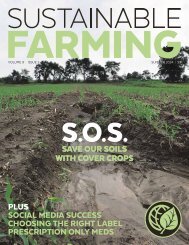
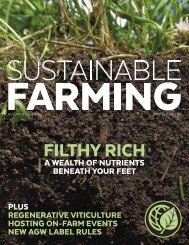
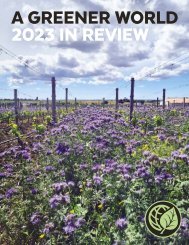
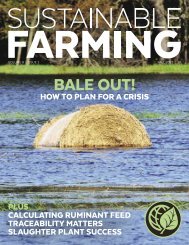
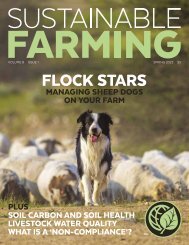
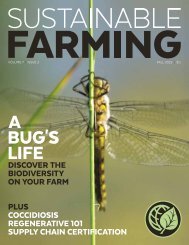
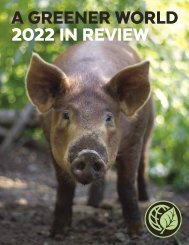
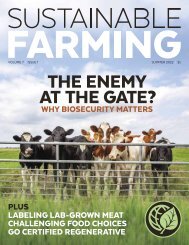
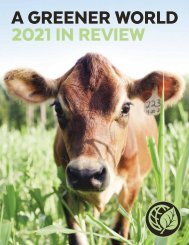
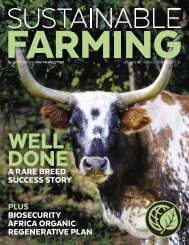




![SF Magazine V5 I1 -- Winter-Spring 2020 [SCREEN ONLY]](https://img.yumpu.com/63122871/1/190x245/sf-magazine-v5-i1-winter-spring-2020-screen-only.jpg?quality=85)